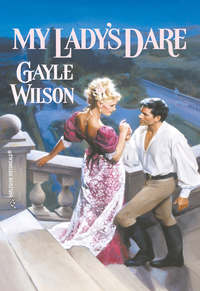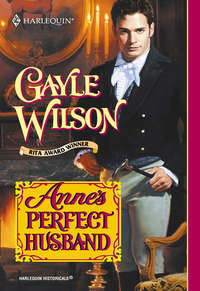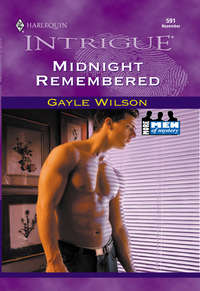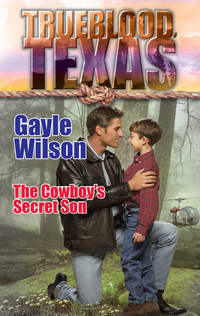
Полная версия
Wednesday's Child
She didn’t know what that meant, but it didn’t matter. Without giving her a chance at a parting shot, he allowed the screen door to slam behind him, leaving her alone in the wide hall. She drew an unsteady breath, wondering if she had made a mistake in coming out here.
She had sworn she would never trust officialdom again, and yet, because of what the sheriff had told her, she was in an isolated house with a rude stranger who carried an outsized chip on his shoulder. And she had just agreed to rent, sight unseen, a room in that house, never having met her hostess.
If the accommodations were truly awful, she could always leave in the morning. She’d been vague enough about her intentions to allow for that.
At least then she wouldn’t have to pretend she wasn’t aware of the absolute masculinity of the man who had gone out to retrieve her luggage. Sexual awareness this potent was a feeling she’d almost forgotten. And one she wasn’t sure she was ready to experience again. Especially not now.
She turned, looking up the narrow stairs once more. Whatever the room at the top of them was like, it was hers for the night. Everything would probably look different in the morning. As for right now…
Right now she needed a hot shower and a bed with clean sheets, even if it had a feather mattress. If Lorena Bedford’s house could provide either of those, she’d deal with everything else. Including Miz Lorena’s arrogant nephew.
CHAPTER THREE
“MY GOODNESS,” Lorena said. “I’d been thinking about that poor man’s family. Wondering how they must feel to finally know what happened to him. I knew some of them would come to Linton, but I never dreamed they might end up staying here. I’ll have to thank Wayne the next time I’m in town. What’s she like?”
Jeb wasn’t sure his impression would be the kind of information his aunt was looking for. Since he’d been wounded, his reaction to people was too frequently measured by their response to his physical condition. It was a fault he was aware of, but unable to entirely suppress.
When he had turned around tonight and found Susan Chandler watching him, resentment that his limp now seemed to be the most interesting thing about him had resurfaced. In the past, before Iraq, his relationships with women had been based on any number of things: mutual sexual attraction, shared interests, even simple proximity. Now he seemed to be defined by only one thing.
He wasn’t sure at what point during the course of his rehabilitation he’d become aware of that. Certainly not in the beginning. He’d been too focused on his own adjustment to his new physical limitations to notice how others reacted to them.
Maybe it had been coming back to Linton, where he’d spent a large part of his adolescence, that had made him aware of how differently the people he’d known then treated him now. Some were openly curious, which he’d been surprised to discover didn’t bother him. Others pretended not to notice, as Mrs. Chandler had done tonight when he’d opened the door for her.
Some—and those were the ones he detested—were determined to be “helpful.” There was nothing more certain to set his teeth on edge than solicitude. Especially from a woman to whom he was physically attracted.
In that respect, he would have to give his great-aunt’s guest credit. In a matter of minutes, she had been able to conceal, if not destroy, any tendency to try to protect him. She hadn’t wanted him to climb the stairs to show her the room, which had been a strike against her. She hadn’t tried to circumvent his determination to retrieve her suitcase or move her car, however, and thank God she hadn’t met him halfway up the stairs to take her bag from him. Despite that ridiculous announcement that she didn’t need to see the room she was about to rent, he grudgingly gave her full marks for the rest.
“Exhausted,” he said aloud in answer to Lorena’s question. “And obviously still stunned.”
“Why, I should say so. Bless her heart. What a thing to have happened. I swear they ought to close that bridge, as many people as have gone off into the river through the years.”
“Maybe between the train wreck and this, they will.”
He was leaning against the kitchen counter watching Lorena take things out of the refrigerator. Although she was almost ninety, she moved exactly as she had when he’d spent those long-ago summers down here. Her motions were quick, almost birdlike, an impression that was magnified by her size and her thinness.
“I didn’t promise her supper,” he said when she pulled a loaf of homemade bread out of the bread box and began unwrapping it. “Actually, I didn’t promise her anything but the use of the room. You don’t have to fix her a meal.”
“You think she’s already eaten?” Gnarled fingers paused over the loaf she had baked this morning, she looked up at him, faded blue eyes questioning.
“I doubt it,” he said, reluctant to add hunger to the many problems Susan Chandler faced. “She’s probably used to eating later than we do.”
Most nights Lorena had supper on the table by six. Of course, since they both began the day shortly after five, Jeb wasn’t complaining. The timing had been an adjustment, however. As he imagined it would be for Mrs. Chandler.
“From Atlanta, you say?”
“That’s what her tag says.”
“That poor woman.” Lorena’s eyes and hands had returned to her task. “I can’t even imagine what she must be feeling.”
“According to the paper, her husband’s car had been submerged for years. She’s had a long time to come to terms with his disappearance.”
Maybe this was only a welcome closure for something she had dealt with long ago.
“Still…” Lorena said. “I mean she was married to the man. She must have loved him. And then…I guess he just disappeared, and she never knew what happened to him. It breaks my heart to think about that.”
Jeb watched as she laid the two thick slices she’d cut off the loaf on a plate she had taken from the cabinet. After she’d spread mayonnaise thickly on both, she began piling ham on one.
“Did you like her?”
His great-aunt’s question caught him off guard. For one thing, he wasn’t sure whether he had or not. There was no denying that he’d found her attractive. And he had also admired her. Despite the day she’d had, she hadn’t backed down when he’d challenged her about the car. And even as much as she obviously wanted the room, she hadn’t been willing to cater to his rudeness. More pluses than minuses.
“Well enough to offer her a room.”
“You knew I’d want you to do that,” Lorena said.
“Still, I wouldn’t have. Not unless I thought she was someone we could share the place with. At least for the night.”
“Is that all she’s staying?” Lorena looked up from the act of slipping a slice of tomato onto the ham. “Seems like it would take longer than that to work out the arrangements.”
“Actually, I don’t know how long she’ll be in town. We didn’t discuss it in detail. And she may decide she wants something more modern after tonight.”
“Maybe I can convince her to stay,” Lorena said, fitting the second piece of bread on top. “I think hot tea, don’t you? I’ve got some chamomile. That should help her sleep.”
“Judging by her eyes—” Jeb began and then stopped.
He’d been about to say that she would be tired enough to sleep without any of his aunt’s herbal remedies. When he remembered what Susan Chandler had been through today, he thought she might appreciate something to help remove the images that must be in her mind.
“What about her eyes?”
“Like I said. She looked exhausted. More emotionally than anything else, maybe, but…I think she’d like that tea.”
His great-aunt reached over and turned the gas on beneath the kettle that always sat in the exact same place on the back of the stove. “Did you show her where the extra quilts are? There’s supposed to be a cold snap, either tomorrow or Sunday.”
“Why don’t you wait until you find out whether she’ll be staying that long before you go worrying about extra cover. She’ll be fine tonight.”
“Maybe I should spoon up some of that peach cobbler.”
“You don’t even know if she’s eaten, Lorena. Why don’t you ask her about dessert before you carry it up?”
The kettle began to whistle, putting an end to his attempt to rein in his great-aunt’s innate hospitality. There was some part of him that welcomed the idea that Susan Chandler’s stay in the house would end after tonight. Another part admitted a degree of interest in her plans that went beyond casual curiosity. She was an extremely attractive woman. Woman being the operative word. At thirty-five, Jeb wasn’t interested in someone who thought JFK referred only to an airport.
Susan Chandler was probably a few years younger than he. Late twenties, early thirties, maybe. Her fair skin showed little signs of aging, but with that dark auburn hair, she would have had no choice but to stay out of the sun.
Physically, she wasn’t the type he was normally attracted to, both taller and thinner than he preferred. Even as that negative assessment formed, he rejected it.
Given his profession, he’d never been interested in long-term relationships. He had judged women he became involved with on their willingness to accept that. As well as on their physical attributes, he admitted. Something he wasn’t particularly proud of. Not considering his present situation.
Despite Susan Chandler’s ability to mask her initial feeling of pity, he’d been aware of it. And the look in her eyes wasn’t one he wanted to see in a woman he was attracted to.
“There now,” Lorena said, stepping back to admire the tray she’d prepared. “What do you think?”
“I think she’s damn lucky Wayne Adams sent her here.”
“Don’t you curse, Jubal Bedford,” Lorena scolded, although it was obvious the compliment pleased her. “Remember, you’re an officer and a gentleman.”
So far, he thought. So far.
“IT’S A BED-AND-BREAKFAST on the outskirts of Linton,” Susan said into her cell phone. “There isn’t a motel around here, but this will do for the time being.”
“Are you sure you don’t want Dave to come down?” her sister asked. “You know he’s more than willing.”
“Dave’s place is there with you, taking care of my very precious nephew.”
After years of trying, including more expensive in vitro attempts than they could afford, Charlotte had finally conceived. Although the pregnancy had been difficult, she was only a couple of weeks away from delivery now. And no one, including her doctor, believed she would go that long.
“I just hate to think of you doing all that by yourself.”
“I’m fine. Just tired. A little overwhelmed with the thought of the possibilities.”
Although she and Charlotte had already discussed the fact that Emma had not been in the car when it was found, Susan hadn’t shared the information about the open door. She had decided there was no point in doing that until the sheriff had had time to confirm whether it had been open when the crane had pulled the SUV from the river.
“And you really think Emma might still be in that town?”
“All I know is that for some reason Richard was here. I need to know what he was doing in such an out-of-the-way area. That’s one thing I need to find out. And maybe then…” She hesitated. “Maybe if someone here remembers seeing him, then—”
“They might have seen Emma, too,” Charlotte said softly.
“She has to be somewhere. God knows I’ve already asked everyone any of us ever knew and gotten nowhere.”
“Well, you keep us informed, you hear? If you don’t call me every day, I swear I’m going to send Dave down there whether you like it or not. And you take care of yourself.”
“I will. You, too. Take care of you and my sweet Davey.”
“He’s fine. We’re both going to be fine. I can feel it,” Charlotte said with a laugh. “Everybody’s so uptight about all this, and I swear, Suz, I’m gonna breeze right through this delivery and pop this baby out quicker than anyone ever has before. Maybe I don’t get them or carry them worth a damn, but I’m gonna be spectacular at birthing them.”
At the joy and confidence in her sister’s voice, tears welled in Susan’s eyes. “I know you will. I’m counting on you, sweetie. We all are.”
“You call me, you hear?”
“I will. Don’t worry.”
“Any news, good or bad, I want to know. Don’t you two try to protect me. I need to know everything.”
“No, I won’t,” Susan promised, “but…” She hesitated again, wondering if this was something she could share, even with someone she was so close to.
“Suz? You still there?”
“You know how you said you knew the delivery would go well?”
“Yeah?”
“That’s the way I feel, Charlotte. She’s here. I know it. I couldn’t tell you how I know that to save my life, but I do.”
There was a long silence on the other end of the line before her sister’s voice, filled with love and concern, came across it. “Honey, don’t you let this break your heart. You can’t. Not again. You just take care of you. Try not to get your hopes up too much. There’s always the possibility…”
Her sister’s warning faded, but the unspoken message was clear. Just because Richard’s body had been found didn’t mean Emma was here. Or even that she was still alive. Most people would argue that the discovery of her father’s body would indicate exactly the opposite.
“I know, but…I have to try.”
“I know. Just remember that all kinds of things could have happened. Seven years is a very long time.”
An eternity in the life of a child. In Emma’s case, the only part of it that she would remember. Whatever had happened during those first fourteen months would have been long forgotten. All the scraps of memory Susan had cherished would mean nothing to her daughter.
“I’ll call you tomorrow,” Susan said, unwilling to let her sister’s warning interfere with her surety. “Sleep tight.”
“Don’t let the bedbugs bite.”
They must have said the same silly rhyme thousands of nights, lying side by side in their twin beds. Tonight, with so much riding on the events of the next few days—for both of them—the familiar words were comforting, providing the same web of love and protection Charlotte and David would give their son from the instant of his birth. The kind that unless Susan found her, she could never be sure that Emma had ever known at all.
“I HOPE JEB MADE YOU welcome. He can sometimes be…a little off-putting.”
Susan wasn’t sure she’d ever heard the term before, but it was appropriate. Lorena, however, had proved to be as warm and welcoming as her great-nephew had been “off-putting.”
“Jeb? Is that your nephew?”
“Great-nephew. And it’s not really Jeb. It’s Jubal. Jubal Early Bedford the Fourth. We’d run out of nicknames by then, so they just used his initials.”
However he’d acquired the name Jeb, Susan thought, it fit. As hard and totally masculine as he had been.
“I know I should have called before I came out.”
Susan smiled her thanks as she accepted the tray the old woman had brought up to her. Although it contained only a sandwich and a cup of tea, the bread was obviously homemade and the piece of ham large enough to droop out over the bottom crust. At the sight, Susan’s mouth watered, reminding her that she hadn’t eaten anything since the cereal bar she’d grabbed from her pantry this morning.
“You want some cobbler to go with that?” Lorena asked as she bustled over to turn back the covers on the bed. “I canned the peaches myself. Not as good as they were this summer, of course, but pretty good for October, I promise you.”
“This is fine, Mrs. Bedford. I don’t expect you to feed me, too.”
“Lorena. You call me Lorena. Everybody does. And as far out as we are, you’ll find it convenient to take your meals with us. I have to cook for Jeb anyway. There’s always plenty.”
The house was less than five miles from town, but apparently to Lorena that seemed a distance one should find onerous to travel for meals. Susan suspected she would find it convenient to eat some of her meals here.
The thought of sharing a table with Jeb Bedford was a bit intimidating, however. That was the second time she had used that word in conjunction with Mrs. Bedford’s great-nephew. Apparently his tactics tonight had been successful. He would probably be pleased to know that.
“Has he been living with you long?”
“Jeb? Since he was released from Walter Reed. I’m glad to have him, of course. Even if some days we don’t say two words to one another, it’s nice to know there’s another soul in the house. You know what they say about having a man about the house? All those things I used to have to find someone in town to do for me, the yard work and such, Jeb does without me even having to ask him. Not that I would have asked him—”
The old woman stopped, putting the arthritis-twisted fingers of both hands over her lips. When she removed them, she smiled at Susan.
“You’d think I’d learn, wouldn’t you. That’s the one topic of conversation that’s forbidden around here. What Jeb can’t do. He admits to no limitations, of course. And he can’t understand why I find it so hard to see him struggle to do things. I guess it’s his training. Some kind of secret unit. Special Forces, but I’m not supposed to tell that either. Anyway, that’s where he got that never-admit-defeat and all, but sometimes…” She shook her head, her smile fading.
“I think it’s always hard to watch those we love struggle,” Susan said. “No matter what it’s with.”
“He was just always so adept at anything physical. Not that he’s not plenty bright, too, you understand, but Jeb could do anything. I remember when he was a little boy, he was as rough-and-tumble as a child could be. Into every sport known to man. Far more than my brother, Jubal, or his father ever were.”
It was slightly disconcerting for Susan to think about the man who had answered the door tonight as a little boy. The persona he’d projected had been too blatantly masculine, even to his determination not to allow her to make any of the normal concessions because of his limp.
“Here I am, babbling on while your tea’s getting cold,” Lorena said. “It’s just so nice to have a guest again. You go on now and eat up. I didn’t mean to keep you from your meal. Folks always like to just settle in their first night.”
Susan smiled, unable to resist either the kindness or the food. She picked up the sandwich, bringing it to her mouth as the old woman crossed the suite and closed the door to the hall. As soon as she disappeared, Susan lowered the food, hunger forgotten.
Special Forces, Lorena had said. And the information fit her initial impressions of Jeb Bedford. The military-style haircut. The olive-drab T-shirt. Even his arrogance.
He was old enough, maybe midthirties, that he must have been a career soldier. And an officer, of course. There was no logical reason for her certainty about that, nothing except the indefinable air of being in command that had been obvious even in the few minutes she’d spent with him.
And it had been only minutes. She had no idea why Jeb Bedford had made such an impression. He had been outright rude, at least until she had told him why she was here. Apparently, although he clearly rejected any sympathy for himself, he wasn’t incapable of feeling it for others.
She attempted to put Lorena’s great-nephew from her mind, lifting the sandwich again. This time she took a bite, savoring the salt-smoke flavor of country ham, perfectly complemented by mayonnaise and the yeasty bread.
She ate half of it before she stopped to taste her tea and realized she hadn’t asked if it was decaf. Tonight it wouldn’t matter. Once she lay down on that feather mattress, she’d be asleep in a matter of minutes. Something devotedly to be wished for, given the events of the last few days.
This afternoon she had seen the river that had taken Richard’s life. No longer were the images of his death imaginary as they had been during the last forty-eight hours. She had been to the place where he’d died. Smelled the miasma of that muddy, slow-moving water. And she would never be able to forget any of it.
She banished those images, determined not to think about them anymore. Tonight she would finish her sandwich and drink her tea and then climb between the lavender-scented sheets her hostess had already turned back.
And then tomorrow she would set about finding Emma.
CHAPTER FOUR
JEB UNSTRAPPED the weighted belt from his ankle and tossed it on the stone floor, waiting for the familiar agony to subside. Damaged muscles still trembling in the aftermath of exertion, he picked up the towel that he’d draped across his waist and used it to wipe sweat from his eyes.
Despite the warnings of Dr. Duncan McKey, the rehabilitation genius at Southeastern Rehab whom he’d come down here to work with, he had increased all the weights this morning as he’d gone through the routine he did twice a day. And he knew he would pay for that senseless bit of bravado.
In spite of McKey’s continued encouragement, however, Jeb hadn’t been able to detect any improvement either in strength or flexibility during his last few sessions. With the medical board’s reevaluation in a few days, he desperately needed to believe there would be.
Although McKey had warned him that overdoing could be as harmful to his progress as slacking off, Jeb had taken matters into his own hands. If he wasn’t able to demonstrate progress this time, he wasn’t sure the Army would give him another shot. After all, he had just about used up the special leave he’d been granted. And the military experts had been skeptical from the first, given the extent of his injuries, that he could get back into the kind of shape necessary to resume his duties with Combat Applications Group, the elite Delta Force team he’d been part of for over ten years.
Actually, he was the only one who had ever believed that was possible. With encouragement from McKey, however, he had given it his all during the six months he’d been in Mississippi.
He’d known from the first time he walked into the surgeon’s office that he’d found a kindred spirit. Between the framed degrees and awards had been an old poem Jeb had remembered reading as a child. It hadn’t made much of an impression then, but the final lines “I am the master of my fate. I am the captain of my soul” had, at the time, seemed to reflect his own determination. And obviously McKey’s philosophy as well.
The problem was determination apparently wasn’t going to be good enough, he acknowledged bitterly, running his palm down the scar that bisected his thigh. Although that was now the most visible of the injuries he’d sustained when the land mine had exploded under his Humvee, it was the mangled foot and ankle that had defied his attempts—and those of his doctors—to regain the mobility he’d had before the injury. That was what the Army was demanding before they would consider returning him to CAG.
It wasn’t that he didn’t understand their insistence. Or accept it. He did. After all, the lives of others might one day depend on how well he was able to perform. What he couldn’t seem to accept was that no matter how hard he worked, he might not be able to change what he feared was going to happen during the upcoming review at Walter Reed.
Disgusted with how skewed his thinking had become this morning, he put the evaluation out of his mind. He wiped perspiration from his neck before he ran the towel across his hair.
From upstairs came the familiar sounds of Lorena fixing breakfast. The soft clink of china. Water churning through the ancient pipes. And no voices.
He glanced at his watch. It was only a little after six. Probably too early for their guest to be up. Which meant that if he didn’t want any further disruption to the routine he’d established since he’d been here, he should go up now and have his breakfast before she came downstairs.
He didn’t bother to analyze why he wanted to avoid Susan Chandler. All he knew was that even after he’d cut out his bedside lamp last night, certain things about their meeting had replayed over and over, stuck in his mind like the notes of some half-forgotten melody. The way the dim light of the old-fashioned chandelier had put threads of gold in her hair. The way her eyes, their irises an unusual blue-gray, held on his, determined not to look at his damaged leg.









